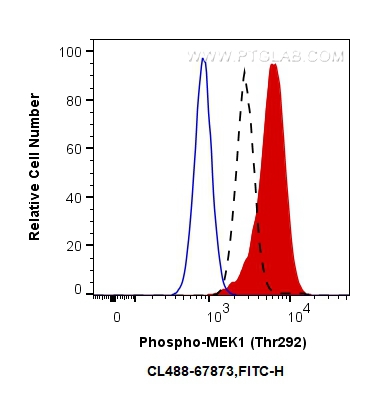验证数据展示
经过测试的应用
| Positive FC (Intra) detected in | Calyculin A treated HeLa cells |
推荐稀释比
| 应用 | 推荐稀释比 |
|---|---|
| Flow Cytometry (FC) (INTRA) | FC (INTRA) : 0.25 ug per 10^6 cells in a 100 µl suspension |
| It is recommended that this reagent should be titrated in each testing system to obtain optimal results. | |
| Sample-dependent, Check data in validation data gallery. | |
产品信息
CL488-67873 targets Phospho-MEK1 (Thr292) in FC (Intra) applications and shows reactivity with human, mouse, rat samples.
| 经测试应用 | FC (Intra) Application Description |
| 经测试反应性 | human, mouse, rat |
| 免疫原 |
Peptide 种属同源性预测 |
| 宿主/亚型 | Mouse / IgG1 |
| 抗体类别 | Monoclonal |
| 产品类型 | Antibody |
| 全称 | mitogen-activated protein kinase kinase 1 |
| 别名 | MAP2K1, MEK1, MAPKK 1, MAP2K 1, EC:2.7.12.2 |
| 计算分子量 | 43 kDa |
| 观测分子量 | 40-50 kDa |
| GenBank蛋白编号 | BC139729 |
| 基因名称 | MEK1 |
| Gene ID (NCBI) | 5604 |
| ENSEMBL Gene ID | ENSG00000169032 |
| RRID | AB_2934580 |
| 偶联类型 | CoraLite® Plus 488 Fluorescent Dye |
| 最大激发/发射波长 | 493 nm / 522 nm |
| 形式 | Liquid |
| 纯化方式 | Protein G purification |
| UNIPROT ID | Q02750 |
| 储存缓冲液 | PBS with 50% glycerol, 0.05% Proclin300, 0.5% BSA, pH 7.3. |
| 储存条件 | Store at -20°C. Avoid exposure to light. Stable for one year after shipment. Aliquoting is unnecessary for -20oC storage. |
背景介绍
MAP2K1 encodes MAPK1, also known as MEK1. MEK1 variants can enhance MEK1 expression and ERK1 phosphorylation that together lead to continuous activation of MEK/ERK signaling pathway. MEK1 bind directly to ERK2 through a region in the N terminus of MEK. In addition, a proline-rich (PR) regulatory sequence in MEK is also involved in MEK-ERK association and signal propagation. The coupling between MEK1 and ERK2 is enhanced through phosphorylation on S298 in the MEK1 PR region, whereas phosphorylation on MEK1 T292 releases the complex. MEK1 T292 is a substrate of ERK2, but the site is also phosphorylated at a basal level when ERK2 is inhibited, suggesting several regulators of this site . Although the S298 site in MEK2 has been conserved, it lacks the T292 phosphorylation site, and it is not a substrate of PAK1. (PMID: 31972311, PMID: 17928366, PMID: 22177953)


